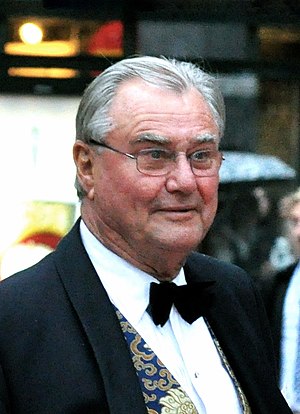Verdnand of Vyvland: Difference between revisions
old>Vyvlu No edit summary |
m (1 revision imported) |
(No difference)
| |
Latest revision as of 21:24, 7 April 2019
| Verdnand | |||||
|---|---|---|---|---|---|
 | |||||
| King of Vyvland | |||||
| Reign | 4 December 1979 – present | ||||
| Predecessor | Welelm IV | ||||
| Heir apparent | Morten, Duke of Wel-Kaskiy | ||||
| Born | 12 June 1942 Vecanbek Palace, Vlud, Vyvland | ||||
| Spouse | Queen Maria of Vyvland | ||||
| Issue Detail | Morten, Duke of Wel-Kaskiy Tomas, Duke of Brubas Elena, Duchess of Lysedal | ||||
| |||||
| House | House of Stanmer-Bajre-Mruk | ||||
| Father | Welelm IV | ||||
| Mother | Queen Noora | ||||
| Religion | Lutheran | ||||
Verdnand (pronounced /ˈveɾd.naːn/, also anglicised as Ferdinand) is the powerless King of Vyvland, having formerly been the King of North Vyvland from 1979 to the formation of the modern Vyvlander state in 1983. During his reign, the monarchy has been significantly altered to remove all political and ceremonial power from the office, which was enacted as a condition of reunification between the North and the non-monarchist South. He is a member of the ruling House of Stanmer-Bajre-Mruk, which can trace itself back to Eylaav fi Paavyl, who conquered the whole of Vyvland by 1952.
Verdnand's father was the previous king, Welelm IV, who was the seventh king in succession to come from the Bajre-Mruk branch of the House of Stanmer. His mother was the Nevan Queen Noora, initially the Grand Duchess of Harju-Sillanpää. Welelm IV was very outspoken in his views, alienating himself from much of the North Vyvlander public by espousing highly reactionary political views. As such, upon Verdnand's ascension to the throne, support in the monarchy as an institution was wavering. However, the passage of a measure passing the line of succession through absolute primogeniture in 1980 proved relatively popular with the public.
Verdnand, as North Vyvland's head of state, was key in the negotiations for Vyvlander reunification in 1983 after the death of Erman Sanker. Demands made by many of the Southern elite were strict to ensure that the country did not unify simply under the Northern system of government, and the terms of the contract eventually signed stripped Verdnand and the monarchy of any rights, privileges or responsibilities, and of his position as head of state. He described this state of affairs at the time as "unfortunate, but for the long-term good of our land as a whole". Verdnand has, however, continued to enjoy warm relations with other nearby Esquarian royals, including Juhani III of Nevanmaa, Mathias IX of Vjaarland, and Sofja II of Geadland.